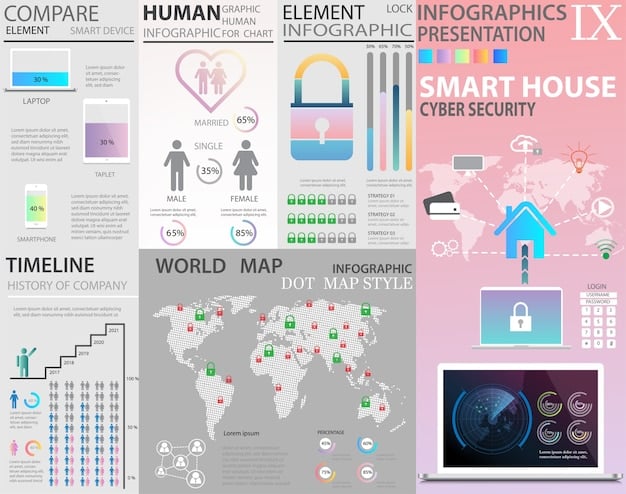New Federal Data Privacy Regulations Set for January 2025

The United States is implementing sweeping new federal regulations on data privacy, set to take effect in January 2025, which will significantly impact how businesses handle personal information, aiming to enhance consumer control and establish uniform national standards.
The landscape of digital privacy in the United States is on the precipice of a significant transformation, with Breaking: New Federal Regulations on Data Privacy Set to Take Effect January 2025. This impending shift marks a pivotal moment for individuals and corporations alike, promising to reshape how personal data is collected, stored, and utilized across the nation. As the deadline approaches, understanding the nuances of these regulations becomes paramount for compliance and safeguarding individual rights.
Understanding the Genesis of Federal Data Privacy Legislation
The push for comprehensive federal data privacy legislation in the U.S. has been a long and arduous journey, steeped in the ever-evolving digital age and a growing public awareness regarding personal data exploitation. For years, the U.S. has operated with a patchwork of state-level laws, a stark contrast to the unified approach seen in regions like the European Union with its General Data Protection Regulation (GDPR). This fragmented regulatory environment has created complexities for businesses operating across state lines and left many consumers unsure of their rights.
The catalyst for these new regulations can be attributed to several factors. High-profile data breaches, concerns over algorithmic bias, and increasing transparency demands from consumers have all contributed to a bipartisan consensus that existing frameworks were insufficient. Calls for a unified federal standard grew louder, aiming to simplify compliance for businesses while simultaneously offering stronger, more consistent protections for American citizens.
The Road to Unification: A Bipartisan Effort
The legislative process leading to these regulations involved extensive debate and negotiation among lawmakers, industry stakeholders, and privacy advocates. Diverse perspectives on data ownership, business innovation, and national security were meticulously weighed. The eventual bill represents a compromise, seeking to balance the need for robust consumer protections with the imperative to foster economic growth and technological advancement.
- Consumer Empowerment: Central to the new regulations is the enhancement of individual control over personal data.
- Business Clarity: The aim is to provide a clearer, more predictable regulatory environment compared to the previous state-by-state variations.
- Technological Neutrality: The law is designed to be adaptable to new technologies, ensuring its relevance for years to come.
This federal initiative addresses long-standing privacy gaps and aims to position the U.S. as a leader in responsible data governance. It’s a testament to the collective understanding that in the digital economy, trust and transparency are not merely ethical considerations but fundamental pillars of a healthy marketplace.
The legislation draws lessons from both successes and shortcomings of prior state-level regulations and international frameworks. Lawmakers carefully studied the impact of laws like the California Consumer Privacy Act (CCPA) and GDPR to craft a regulation that is both effective and uniquely suited to the American context. This historical perspective is vital in truly appreciating the gravity and potential impact of the upcoming changes.
Key Provisions of the New Federal Data Privacy Regulations
The forthcoming federal data privacy regulations introduce a comprehensive set of provisions designed to fundamentally alter how personal data is managed across various sectors. These provisions are rooted in principles of transparency, accountability, and individual control, aiming to establish a baseline of privacy protection nationwide. Businesses, from small startups to multinational corporations, will need to meticulously review their data handling practices to ensure full compliance by January 2025.
One of the most significant aspects of these regulations is the expansive definition of “personal data.” Unlike some narrower state laws, this federal act broadly defines personal information to include not only obvious identifiers like names and addresses but also IP addresses, biometric data, precise geolocation information, and even inferences drawn from data that could identify an individual. This broad scope ensures that a wide array of data processing activities falls under the purview of the new law.
Expanded Consumer Rights: A New Era of Control
At the core of the new regulations are several enhanced rights granted to consumers, empowering them to exert greater control over their digital footprint. These rights mirror, and in some cases expand upon, those found in leading global privacy frameworks:
- Right to Access: Consumers will have the right to confirm whether a company is processing their personal data and to access that data.
- Right to Correction: The ability to request corrections of inaccurate or incomplete personal data held by companies.
- Right to Deletion: The right to request the deletion of personal data under certain circumstances, often referred to as the “right to be forgotten.”
- Right to Opt-Out of Sale/Sharing: Consumers gain the explicit right to opt-out of the sale or sharing of their personal data for targeted advertising purposes or other uses.
- Right to Data Portability: The right to receive personal data in a structured, commonly used, and machine-readable format, and to transmit that data to another controller.
These rights are not merely theoretical; the regulations mandate clear, accessible mechanisms for consumers to exercise them. Companies will be required to establish transparent processes, including dedicated portals or contact methods, to facilitate these requests within specified timeframes.
New Obligations for Businesses: Beyond Simple Compliance
Beyond honoring consumer requests, businesses face a series of proactive obligations under the new law. These include conducting regular data protection impact assessments (DPIAs) for high-risk data processing activities, implementing robust security measures to protect personal data from unauthorized access or breaches, and maintaining detailed records of data processing activities. The emphasis is on accountability and demonstrating continuous compliance, not just sporadic adherence.
Furthermore, the regulations introduce strict requirements regarding consent. Companies will typically need explicit, clear, and unambiguous consent from individuals before collecting and processing their personal data for specific purposes, particularly for sensitive data categories. The days of implied consent or obscure privacy policies are drawing to a close, as the new framework prioritizes informed decision-making by consumers.

The regulations also lay out specific rules concerning data retention, prohibiting companies from holding onto personal data for longer than is necessary to fulfill the purpose for which it was collected. This “data minimization” principle is a fundamental shift for many organizations accustomed to hoarding vast amounts of data without clear purpose. Moreover, businesses will be required to implement clear and concise privacy notices that explain their data practices in plain language, avoiding legal jargon.
Companies must also be prepared for enhanced oversight and enforcement. The new law provides for dedicated regulatory bodies that will have investigative and enforcement powers, including the authority to levy significant fines for non-compliance. This strengthens the hand of regulators and underscores the serious intent behind these sweeping changes, making it imperative for businesses to prioritize their compliance efforts.
Impacts on Businesses Across Sectors
The **Breaking: New Federal Regulations on Data Privacy Set to Take Effect January 2025** will reverberate across virtually every sector of the American economy. While certain industries, such as technology, marketing, and healthcare, have traditionally dealt more directly with data privacy, the expansive nature of these new rules means few businesses will remain untouched. Understanding these sector-specific implications is crucial for developing targeted compliance strategies.
For the technology sector, particularly companies heavily reliant on data analytics, targeted advertising, and cloud services, the regulations present a significant paradigm shift. The tighter restrictions on personal data collection, use, and sharing will necessitate fundamental redesigns of data flows and consent mechanisms. Ad-tech firms, for instance, will need to re-evaluate their entire business model in light of stringent opt-out rights and consent requirements for cross-context behavioral advertising.
E-commerce and Retail: Navigating Consumer Preferences
E-commerce and retail businesses, which collect vast amounts of consumer data for personalized shopping experiences, inventory management, and marketing, will face direct impacts. They must ensure their data collection practices are transparent, their consent mechanisms are robust, and they can efficiently fulfill consumer rights requests. This might involve:
- Implementing new CRM (Customer Relationship Management) system features to track and manage consumer privacy preferences.
- Re-evaluating loyalty programs and personalized marketing campaigns to ensure they align with new consent rules.
- Investing in secure data storage solutions and enhanced breach notification protocols.
The challenge for these sectors lies in balancing personalized customer experiences with heightened privacy expectations. Businesses will need to innovate how they engage with consumers and deliver value without compromising privacy. A key area will be the handling of customer purchasing history and website browsing behavior, which fuel many personalization efforts. Clear communication about data use will be paramount to maintaining customer trust and avoiding punitive measures.
Healthcare and Financial Services: Fortifying Existing Safeguards
While often already subject to stringent privacy laws like HIPAA and GLBA, the healthcare and financial services sectors will still encounter new layers of compliance. These regulations add federal oversight to areas not explicitly covered by existing sector-specific laws, such as general marketing practices or specific types of data analytics. The new rules may introduce stricter data portability requirements or enhanced accountability for third-party vendors handling sensitive information on their behalf. Due diligence in vendor management will become even more critical.
For these industries, the focus will be on integrating the new federal privacy law into their already complex regulatory frameworks, ensuring a unified and consistent approach to data protection. This often means updating existing policies and procedures, retraining staff, and enhancing their privacy by design principles in new product and service development. The goal is to avoid redundancy while simultaneously strengthening their overall data governance posture, protecting highly sensitive consumer information from potential misuse or breaches.
Challenges and Opportunities for Compliance
The implementation of the **Breaking: New Federal Regulations on Data Privacy Set to Take Effect January 2025** presents a dual landscape of significant challenges and unprecedented opportunities for businesses. Navigating this new regulatory environment will require strategic planning, technological investment, and a cultural shift towards prioritizing data stewardship. The early adopters of comprehensive compliance measures are likely to gain a competitive advantage.
One of the primary challenges businesses face is the sheer complexity of understanding and interpreting the nuances of the new law. Unlike a single-industry regulation, this federal act spans diverse sectors, each with unique data processing needs. Companies will need to map their entire data lifecycle, from collection to deletion, identifying where personal data resides and how it is processed. This often involves performing data audits and creating detailed data inventories, which can be resource-intensive processes.
Operational Hurdles: From Data Mapping to Training
Operationalizing compliance will be another significant hurdle. This includes updating privacy policies and notices to be clear and conspicuous, implementing robust consent management platforms, and developing efficient mechanisms for responding to consumer rights requests. Many organizations will need to invest in new technologies to automate these processes, especially those with large customer bases. Employee training will also be crucial, ensuring that all staff members, from customer service to IT, understand their roles in upholding privacy standards.
- Resource Allocation: Dedicating sufficient budgets and personnel for legal, IT, and operational changes.
- System Integration: Ensuring privacy controls are embedded into existing IT systems and new developments.
- Third-Party Risk Management: Vetting and monitoring vendors to ensure their compliance with data processing agreements.
The process of becoming compliant is not a one-time event but rather an ongoing commitment. Businesses must establish internal governance frameworks, conduct regular privacy reviews, and be prepared to adapt to future interpretations or amendments of the law. This sustained effort requires dedicated privacy teams or designated privacy officers who can champion these initiatives within the organization.

Despite these challenges, the new regulations offer significant opportunities. By enhancing data privacy, businesses can build stronger trust and loyalty with their customers. Consumers are increasingly valuing privacy, and companies that demonstrate a genuine commitment to protecting personal data are likely to differentiate themselves in the marketplace. Proactive compliance can be transformed from a burden into a brand advantage, signaling to customers that their personal information is valued and respected.
Furthermore, the establishment of a clear federal standard can simplify operations for businesses that previously navigated a maze of state-specific laws. While the initial investment in compliance will be substantial, in the long run, a unified framework could reduce the administrative burden and legal risks associated with disparate regulations. This harmonization can foster greater innovation, as companies can focus on developing privacy-preserving products and services with a clearer understanding of the regulatory landscape, ultimately benefitting both businesses and consumers.
Enforcement Mechanisms and Penalties
The efficacy of the **Breaking: New Federal Regulations on Data Privacy Set to Take Effect January 2025** hinges significantly on its enforcement mechanisms and the penalties prescribed for non-compliance. Unlike previous fragmented approaches, this federal law introduces a unified and robust framework for oversight, empowering specific entities to investigate violations and impose meaningful sanctions. This shift underscores the seriousness with which data privacy is now viewed at the national level.
The primary enforcement authority for these new regulations is expected to reside with a combination of federal agencies, likely including the Federal Trade Commission (FTC) and possibly a newly established dedicated privacy agency or division. These bodies will be tasked with interpreting the law, conducting investigations, and issuing guidance to ensure widespread adherence. Their powers will extend to conducting audits, issuing subpoenas, and compelling testimony from organizations suspected of non-compliance.
Consequences for Non-Compliance: More Than Just Fines
The penalties for violating the new federal data privacy regulations are designed to be substantial, serving as a significant deterrent. These are expected to include:
- Financial Penalties: Companies found in violation could face hefty fines, potentially calculated per violation or as a percentage of their annual revenue, similar to GDPR’s penalty structure.
- Corrective Actions: Beyond monetary fines, regulators can mandate specific corrective actions, such as changing data processing practices, implementing enhanced security measures, or deleting improperly collected data.
- Reputational Damage: Public enforcement actions and fines can severely damage a company’s reputation, leading to loss of customer trust and market share.
- Private Right of Action: While still debated during legislative drafting, there is a strong possibility that individuals might have a limited private right of action, allowing them to sue companies for certain privacy violations, further increasing financial risk.
The financial impact of non-compliance could be devastating for businesses, especially smaller entities ill-prepared for the new requirements. The intent is not merely to punish, but to incentivize proactive data governance and ensure a fundamental shift in corporate behavior towards greater accountability. Regulators are likely to focus on egregious violations and systemic failures, but also on patterns of non-compliance that indicate a disregard for consumer rights.
Beyond the immediate penalties, businesses might face cascading consequences such as increased legal scrutiny, higher insurance premiums for data breach coverage, and difficulty attracting and retaining talent who are sensitive to ethical corporate practices. The long-term reputational fallout from privacy missteps can be far more damaging than any immediate fine, affecting brand loyalty and market valuation. Therefore, investing in compliance is not just about avoiding penalties, but about safeguarding the fundamental viability of the business in an increasingly privacy-aware world.
The enforcement regime will likely prioritize education and guidance in the initial phases, especially for smaller businesses, to foster widespread compliance rather than immediate punitive action. However, intentional or reckless disregard for the regulations will undoubtedly lead to swift and severe penalties. This dual approach aims to cultivate a culture of privacy while ensuring that egregious violations are met with appropriate legal consequences, solidifying the importance of data protection in the digital economy.
Preparing for the January 2025 Deadline: A Roadmap
With the **Breaking: New Federal Regulations on Data Privacy Set to Take Effect January 2025**, time is of the essence for businesses to meticulously prepare for compliance. Proactive measures adopted now can mitigate risks, minimize disruptions, and position organizations as trustworthy custodians of consumer data. Rushing compliance efforts closer to the deadline can lead to costly errors and missed opportunities for strategic advantage.
The first critical step is to conduct a comprehensive data audit. This involves identifying all personal data collected, where it is stored, how it is processed, and with whom it is shared. Creating a detailed data inventory is fundamental to understanding the scope of personal data processing activities and pinpointing areas that require remediation. This process often reveals previously unknown data flows or redundant data storage, which can also present efficiency improvements.
Essential Steps for Comprehensive Readiness
Once a data inventory is complete, businesses should embark on a multi-faceted compliance roadmap:
- Legal Review: Engage legal counsel specializing in data privacy to interpret the specific provisions of the new law as they apply to your business model and industry.
- Policy Updates: Revise and update all internal and external privacy policies, terms of service, and data retention schedules to reflect the new requirements. Ensure privacy notices are clear, concise, and easily accessible.
- Technology Implementation: Invest in or update privacy-enhancing technologies (PETs) and consent management platforms (CMPs) to automate consent collection, data subject access requests (DSARs), and data deletion processes.
- Employee Training: Develop and implement comprehensive privacy training programs for all employees, especially those who handle personal data directly. Foster a culture of privacy awareness across the organization.
Beyond these immediate steps, organizations should develop an ongoing privacy governance framework. This includes appointing a dedicated Privacy Officer or team, establishing regular data protection impact assessments (DPIAs) for new projects and technologies, and implementing robust incident response plans for data breaches. Continuous monitoring and adaptation will be key, as the regulatory landscape may evolve over time with new interpretations or technological advancements.
Engaging with industry associations and privacy groups can also provide valuable insights and best practices for compliance. Learning from peers and staying abreast of regulatory guidance will be crucial. For many businesses, preparing for these regulations will not just be a compliance exercise but an opportunity to fundamentally rethink their relationship with data, fostering trust and loyalty as core business values. Those who embrace this shift proactively will undoubtedly be better positioned for success in the evolving digital economy.
The Long-Term Vision for Data Privacy in the US
The enactment of the **Breaking: New Federal Regulations on Data Privacy Set to Take Effect January 2025** is not merely an endpoint but a significant milestone in a much larger, evolving narrative concerning data privacy in the United States. This comprehensive federal law establishes a foundational framework, setting the stage for a future where data stewardship and individual rights are central to digital interactions. The long-term vision extends beyond basic compliance, aiming for a more transparent, secure, and respectful digital ecosystem.
This new federal standard is anticipated to be a living document, subject to refinements and adaptations as technology advances and societal expectations regarding privacy continue to shift. Future amendments or complementary legislation might address emerging concerns such as artificial intelligence ethics, facial recognition technology, or quantum computing’s impact on data security. The initial framework provides a strong base upon which further, more nuanced regulations can be built, ensuring the law remains relevant and effective.
A Shift Towards National Data Harmony and Global Interoperability
One of the most profound long-term impacts will be the harmonization of data privacy standards across the U.S. By creating a unified federal law, the legislative patchwork that currently complicates interstate commerce and consumer protection can be resolved. This clarity will benefit both businesses, by reducing compliance burdens, and consumers, by providing consistent protections regardless of their location. This moves the U.S. closer to a national standard that fosters predictable and fair data practices.
Furthermore, the federal regulations could facilitate greater interoperability with international data privacy frameworks, such as the GDPR in Europe. While not an exact replica, the new U.S. law incorporates many recognized global best practices, potentially easing data flows between the U.S. and other regulated regions. This alignment could reduce friction for multinational corporations and enhance trust in cross-border data transfers, promoting more efficient global digital trade.
The long-term vision also encompasses a cultural transformation within businesses. Compliance will move beyond a checkbox exercise to become an integral part of corporate governance and product design. “Privacy by design” and “security by design” principles are expected to become standard practice, meaning privacy considerations are baked into products, services, and systems from their inception, rather than being an afterthought. This proactive approach cultivates a more robust and resilient data ecosystem.
Ultimately, these regulations aim to foster greater trust in the digital economy. As consumers become more aware of their data rights and have clearer means to exercise them, they are likely to engage more confidently with online services. This mutual trust between individuals and businesses is crucial for innovation and sustained growth in the digital age. The federal data privacy regulations in the U.S. represent a vital step towards realizing this vision, promising a safer and more transparent future for personal data.
Ethical Dimensions of Data Privacy in a Connected World
The advent of the **Breaking: New Federal Regulations on Data Privacy Set to Take Effect January 2025** transcends mere legal compliance; it brings to the forefront the profound ethical dimensions of data privacy in our increasingly connected world. As technology continues its relentless march forward, generating unprecedented volumes of personal data, the ethical responsibilities of those who collect, process, and utilize this information become paramount. These regulations implicitly acknowledge that data is not just an asset, but a reflection of individual lives, choices, and identities.
At its core, data privacy is an ethical issue rooted in respect for individual autonomy and dignity. The ability to control one’s personal information is integral to personal freedom and the right to define oneself. When data is collected without informed consent, used for undisclosed purposes, or subjected to breaches, it can lead to tangible harms such as discrimination, financial loss, and psychological distress. The new federal regulations strive to mitigate these harms by enforcing greater transparency and individual control, mirroring a societal pushback against opaque data practices.
Balancing Innovation with Responsibility: An Ethical Conundrum
A key ethical challenge lies in balancing the undeniable benefits of data-driven innovation with the imperative to protect individual privacy. Big data analytics and artificial intelligence offer enormous potential for advancements in healthcare, education, and economic development. However, these powerful tools can also pose risks if not developed and deployed ethically. The regulations encourage businesses to consider these ethical trade-offs, pushing for responsible innovation that integrates privacy from the outset rather than adding it as an afterthought.
- Transparency: Clearly informing individuals about how their data is used, fostering trust rather than suspicion. This goes beyond legal minimums to truly educate users.
- Fairness: Ensuring that data processing does not lead to unfair or discriminatory outcomes, particularly for vulnerable populations.
- Accountability: Holding organizations responsible for the ethical implications of their data practices, beyond mere legalistic compliance.
Furthermore, the ethical considerations extend to the design of algorithms and artificial intelligence systems. Biases embedded in data or algorithms can perpetuate and even amplify existing societal inequalities. The new regulations, by demanding greater transparency and potentially allowing for the right to explanation regarding automated decisions, nudge companies towards more ethically conscious algorithm development. This acknowledges that technology is not neutral and that its creators have a moral obligation to minimize harm.
Ultimately, the federal data privacy regulations serve as a legal framework to underpin a growing ethical consensus: that personal data is a fundamental right deserving of robust protection. While the law sets the minimum standard, ethical leadership in data stewardship will distinguish truly responsible organizations. By embracing the spirit of these regulations, and not just the letter, businesses and individuals can work towards building a digital future that is not only technologically advanced but also ethically sound and respectful of human dignity.
| Key Aspect | Brief Description |
|---|---|
| ➡️ Compliance Deadline | New federal data privacy regulations take effect in January 2025. |
| 🛡️ Enhanced Consumer Rights | Includes rights to access, correct, delete, and opt-out of data sharing. |
| 🏢 Business Obligations | Requires transparent practices, robust security, and explicit consent for data processing. |
| 💸 Enforcement & Penalties | Significant financial fines and corrective actions for non-compliance. |
Frequently Asked Questions About Federal Data Privacy Regulations
The regulations broadly define personal data to include any information that identifies, relates to, describes, is capable of being associated with, or could reasonably be linked, directly or indirectly, with a particular consumer or household. This encompasses names, addresses, emails, IP addresses, biometric data, precise geolocation, browser history, and inferences drawn from data.
The new federal regulations aim to establish a baseline national standard, potentially preempting some, but not all, state-specific laws like CCPA. While it incorporates many elements from state laws, its broader scope and unified enforcement are intended to provide more consistent protection and reduce compliance complexity for businesses operating nationwide.
Consumers will be able to exercise their rights by submitting requests directly to businesses, likely through designated online portals, toll-free numbers, or email addresses. Companies are mandated to respond to these requests within a specified timeframe, providing access to, allowing correction or deletion of, or opting out of the sale of personal data.
While the regulations are designed to be comprehensive, there may be certain exemptions or reduced obligations for very small businesses based on criteria like revenue thresholds or the volume of personal data processed. However, many small businesses will still need to adapt their practices, especially if they handle sensitive data or engage in extensive online marketing.
Non-compliant businesses face significant financial penalties, potentially reaching millions of dollars depending on the severity and number of violations. Regulators can also mandate corrective actions, such as changes to data processing practices. Beyond legal repercussions, non-compliance can lead to severe reputational damage and a loss of consumer trust.
Conclusion: A New Chapter for Data Protection in the US
The imminent arrival of the **Breaking: New Federal Regulations on Data Privacy Set to Take Effect January 2025** marks a seminal moment for data protection in the United States. This comprehensive legislation is poised to usher in an era of greater transparency, accountability, and individual empowerment regarding personal data. While the journey to full compliance will present challenges for many organizations, the long-term benefits of a harmonized, robust data privacy framework are clear. By fostering trust between consumers and businesses, these regulations lay the groundwork for a more secure, ethical, and thriving digital economy, moving the nation towards a unified and globally respected standard of data stewardship.





